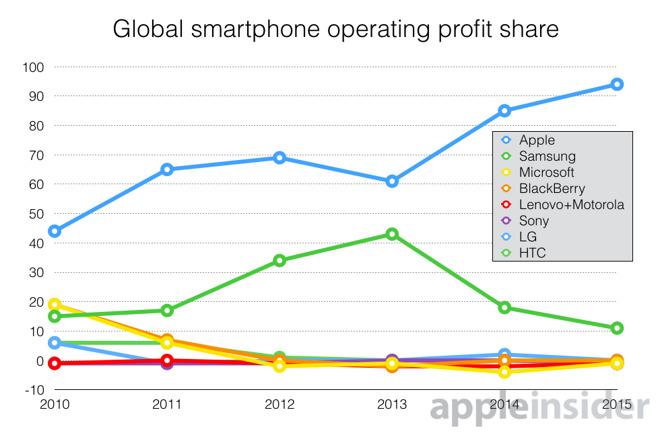[h=1]Apple grabs over 94% of smartphone profits, while selling less than the competition[/h] November 17, 2015 Kishore Ganesh Leave a comment

The smartphone industry is no place for new players, and even the old guard are finding it hard to survive in this increasingly competitive marketplace.
Release something innovative, and you will see another company popping up the exact same technology in another smartphone with a different name and a lower price tag slapped on to it.
With better specs being packed into cheaper smartphones, getting a profit out of the smartphone business is a task in of itself. In fact, major players like HTC, LG and Sony have not been able to generate sufficient profits, and have even incurred losses.

The only outlier to this trend is Apple, and to a lesser extent, Samsung. This is proved by the fact that Apple grabbed over 94% of smartphone profits, according to third-quarter reports by Cannacord Genuity.
The second place was occupied by Samsung, with 11% of total profits. Apple has grabbed this many profits even as it is selling less phones than the competition. In the smartphone market, only 14% of phones are iPhones, and 25% of phones are Samsung phones. In fact, according to the report, Samsung has outsold iPhones two to one, but is still far behind in profits.
The other players like LG, Sony and HTC actually incurred losses, which doesn’t bode well for them.
Apple has been able to achieve such high profits because of its large profit margins. It sells fewer phones, but makes more money out of them. Firstly, Apple has built an image of itself as a luxury brand, and so it has been able to set high prices for its smartphones. Secondly, Apple releases very few phones each year (Two at the most), and that leads to less development and R&D costs. On the other hand, HTC, Samsung, etc release dozens of phones seemingly every quarter, which just shrinks the profit margins while creating unnecessary competition.
What do you think? Can Apple continue to depend on the iPhone as its main source of income?
http://techgeekforever.com/2015/11/...fits-while-selling-less-than-the-competition/
The smartphone industry is no place for new players, and even the old guard are finding it hard to survive in this increasingly competitive marketplace.
Release something innovative, and you will see another company popping up the exact same technology in another smartphone with a different name and a lower price tag slapped on to it.
With better specs being packed into cheaper smartphones, getting a profit out of the smartphone business is a task in of itself. In fact, major players like HTC, LG and Sony have not been able to generate sufficient profits, and have even incurred losses.

The only outlier to this trend is Apple, and to a lesser extent, Samsung. This is proved by the fact that Apple grabbed over 94% of smartphone profits, according to third-quarter reports by Cannacord Genuity.
The second place was occupied by Samsung, with 11% of total profits. Apple has grabbed this many profits even as it is selling less phones than the competition. In the smartphone market, only 14% of phones are iPhones, and 25% of phones are Samsung phones. In fact, according to the report, Samsung has outsold iPhones two to one, but is still far behind in profits.
The other players like LG, Sony and HTC actually incurred losses, which doesn’t bode well for them.
Apple has been able to achieve such high profits because of its large profit margins. It sells fewer phones, but makes more money out of them. Firstly, Apple has built an image of itself as a luxury brand, and so it has been able to set high prices for its smartphones. Secondly, Apple releases very few phones each year (Two at the most), and that leads to less development and R&D costs. On the other hand, HTC, Samsung, etc release dozens of phones seemingly every quarter, which just shrinks the profit margins while creating unnecessary competition.
What do you think? Can Apple continue to depend on the iPhone as its main source of income?
http://techgeekforever.com/2015/11/...fits-while-selling-less-than-the-competition/
